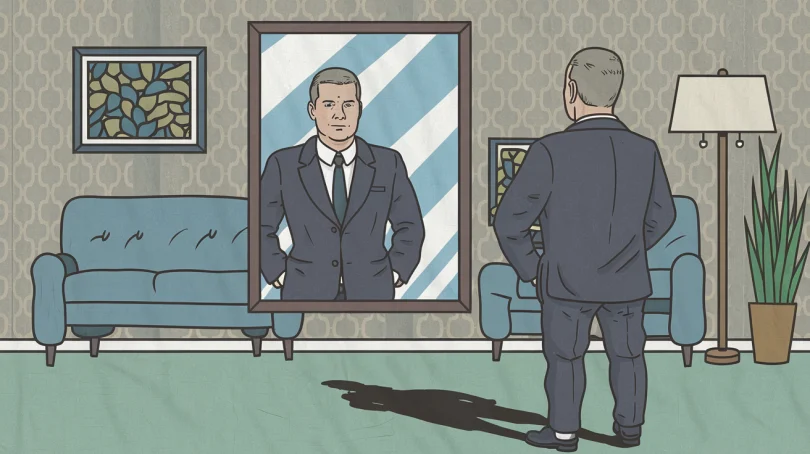Have you ever wondered what happens behind closed doors when a narcissist is left to their own devices? Imagine, for a moment, that the person who dazzles you with charm, who seems to command every room with an air of superiority, reveals a side so repulsive, so unfiltered by social decorum, that it leaves you both shocked and saddened.
Today, we’re diving deep into one of the most provocative and eye-opening topics in the study of personality disorders: the six disgusting things narcissists always do when they are alone. This isn’t about judging or sensationalizing behavior but rather about uncovering the hidden rituals and habits that stem from years of emotional manipulation, deep-seated insecurity, and a desperate need for control.
In this exploration, we’ll peel back the layers of narcissistic behavior and reveal what happens in the solitude of a narcissist’s life a life that, beneath its glittering surface, is often marked by disturbing rituals that serve as both a defense mechanism and a cry for validation.
Drawing from years of clinical observation, insights from psychological research, and real-life case studies, I’ll guide you through these behaviors in clear, accessible language. Whether you’re familiar with narcissistic abuse or simply curious about what happens behind closed doors, this discussion will equip you with the knowledge to understand and perhaps even predict the unsettling habits that emerge when a narcissist is left alone with their thoughts.
Let’s begin by delving into the very nature of narcissistic behavior and what happens when the constant need for external validation is suddenly removed from the equation.
1. Compulsive Self-Admiration
To start, consider the narcissist’s relationship with their reflection. When alone, many narcissists engage in an almost compulsive ritual of self-admiration. They’ll spend long periods in front of the mirror not just checking their appearance but engaging in extended sessions of self-praise. They might recite affirmations, criticize any perceived flaw, and even record themselves to later replay and scrutinize every detail.
While this behavior may seem humorous or pitiable to an outsider, it’s a desperate attempt to reaffirm their self-worth in the absence of external validation. Research in personality psychology consistently identifies this as a hallmark of narcissistic individuals.
The mirror becomes a surrogate for the adoring audience they crave, and when no one else is around, they turn inward in an endless loop of self-obsession. Often accompanied by excessive grooming or makeup application, this ritualistic self-admiration is a fragile construct built on years of manipulation and insecurity.
Related Topics:
Best Responses to a Covert Narcissist’s Emotional Attacks?
9 ways to deal with toxic people
Forgiveness won’t save a Relationship
How to Practice SELF LOVE to Stop Having TOXIC Relationships
5 Weird Texting Habits Of Narcissists
2. Internal Conflict-Laden Self-Talk
Another disgusting habit narcissists exhibit when alone is their tendency to engage in covert self-talk that swings between grandiosity and self-loathing. In private moments, they may oscillate wildly between boasting about their perceived superiority and berating themselves for any hint of failure.
This internal dialogue isn’t simple self-reflection it’s a turbulent battle between the idealized version of themselves they project to the world and the deep-seated inadequacy lurking beneath. Psychologists note that this inner conflict can manifest in verbal outbursts, where narcissists speak to themselves in ways that are both egotistical and despairing.
They might refer to themselves in the third person as if they’re both the hero and the tragic figure in their saga. This behavior is deeply disturbing because it highlights the dichotomy of their existence: a confident public persona and a private self tormented by relentless self-criticism. Such contradictory self-talk is a constant reminder of their internal instability.
3. Obsessive Digital Behavior
In our modern age, where social media is a primary source of validation, narcissists often display disturbing tendencies toward obsessive digital behavior when alone. They might spend hours scrolling through their feeds, meticulously curating their online persona, and obsessively monitoring how their posts are received.
Checking likes, comments, and shares on old posts or even stalking the profiles of past admirers can become all-consuming, leading to a state of digital dependency. Studies show that excessive social media use can be particularly harmful for those with narcissistic traits, reinforcing a cycle of validation and rejection.
In isolation, narcissists become trapped in a virtual loop where the absence of immediate adoration fuels despair and inadequacy. This relentless self-monitoring isn’t just a quirk it’s a disturbing testament to the profound impact of lacking genuine human interaction.
4. Vengeful Fantasy Planning
A fourth repulsive behavior is the narcissist’s indulgence in secret fantasies of revenge. These vivid imaginings involve detailed scenarios where they reclaim control and exact punishment on those who’ve slighted them whether real or perceived.
In private, they may scribble elaborate plans or record voice memos detailing how they’d destroy the lives of those who’ve challenged their authority. While these fantasies might remain in the realm of thought, they’re a dangerous outlet for pent-up anger and frustration from a lifetime of emotional manipulation.
Psychological research indicates that narcissists are prone to vengeful thoughts, as rejection or criticism triggers an intense desire for retribution. Nurtured in isolation, these unchecked thoughts reveal a capacity for cruelty that’s truly unsettling beneath their polished exterior.
5. Self-Destructive Coping Mechanisms
The fifth disgusting habit is the narcissist’s tendency to engage in self-destructive behavior such as substance abuse or reckless actions as a means of coping with internal pain. While they project control and superiority in public, many turn to alcohol, drugs, or even self-harm in solitude to numb overwhelming emptiness and despair.
Clinical observations note that these tendencies are alarmingly common among narcissistic individuals, especially when forced to confront their vulnerabilities. This isn’t mere escapism it’s a deeply ingrained response to the chaos of rejection and isolation.
Using substances or risky behaviors temporarily dulls the pain of constant self-scrutiny and unmet expectations, underscoring the profound self-hatred festering beneath their grandiosity. It’s both tragic and repulsive.
6. Ritualistic Self-Aggrandizement
Finally, narcissists often practice secret self-aggrandizement through distorted self-talk and ritualistic behaviors when alone. Free from scrutiny, they engage in actions to boost their fragile ego beyond mirror gazing, this might include curating their appearance, rearranging their environment to reflect their ideal self, or fantasizing about future triumphs.
Accompanied by a hyperbolic, self-congratulatory internal monologue tinged with desperation, this obsession borders on the pathological. Every action is imbued with self-admiration, yet solitude reveals the stark contrast between their idealized self and internal emptiness. To an outsider, this might seem comical or pitiable, but it’s a profound illustration of how deeply narcissistic self-delusion permeates their life.
A Deeper Understanding
As we reflect on these six behaviors compulsive self-admiration, internal conflict-laden self-talk, obsessive digital stalking, vengeful fantasy planning, self-destructive coping strategies, and ritualistic self-aggrandizement it’s clear they’re not mere eccentricities.
They’re symptomatic of deep-seated emotional trauma and internal instability. Each action, while repulsive, offers a window into the narcissist’s psyche: a constant battle between an inflated public persona and a tormented inner life. Psychological research frames these as maladaptive coping strategies, developed over years of manipulation, rejection, and unmet needs for validation. They’re a desperate cry for help, signaling profound suffering beneath layers of arrogance.
Recognizing these patterns isn’t just about understanding narcissists it’s also a tool for those around them to set healthy boundaries and protect themselves from emotional harm. If you’re in a relationship with someone exhibiting these habits, their actions reflect their inner chaos, not your worth. Awareness empowers you to seek guidance, establish boundaries, or distance yourself from toxicity, safeguarding your well-being.






